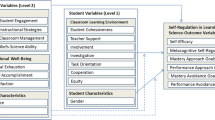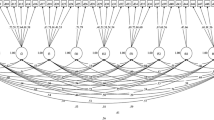Abstract
Metacognition refers to an individual's knowledge, control and awareness of his/her learning processes. An important goal of education is to develop students as metacognitive, life-long learners. However, developing students' metacognition and evaluating whether classrooms are oriented to the development of students' metacognition are difficult and often time-consuming tasks. Further, no instruments that measure key dimensions related to classroom factors that specifically influence the development of students' metacognition have been available. This article describes the conceptualisation, design, and validation of an instrument for evaluating the metacognitive orientation of science classroom learning environments. The metacognitive orientation of a learning environment is the extent to which that environment supports the development and enhancement of students' metacognition. Social constructivism was the guiding referent informing the instrument's orientation and development. This instrument measures students' perceptions of the extent to which certain psychosocial dimensions, evident in learning environments where interventions have resulted in enhanced student metacognition, are evident in their science classrooms. Findings from the use of this instrument complement what is already known from research studies to be generally the case in relation to science classrooms' metacognitive orientation.
Similar content being viewed by others
REFERENCES
Baird, J. R. (1986). Improving learning through enhanced metacognition: A classroom study. European Journal of Science Education, 8, 263–282.
Baird, J. R., Fensham, P. J., Gunstone, R. F., &; White, R. T. (1991). The importance of reflection in improving science teaching and learning. Journal of Research in Science Teaching, 28, 163–182.
Baird, J. R., &; Mitchell, I. J. (1987). Improving the quality of teaching and learning: An Australian case study — The PEEL Project. Melbourne, Australia: Monash University.
Baird, J. R., &; Northfield, J. R. (1992). Learning from the PEEL experience. Melbourne, Australia: Monash University.
Barell, J. (1991). Teaching for thoughtfulness. New York: Longman.
Billett, S. (1996). Situated learning: Bridging sociocultural and cognitive theorizing. Learning and Instruction, 6, 263–280.
Bloom, B. S. (1976). Human characteristics and school learning. New York: McGraw Hill.
Brislin, R. W. (1976). Translation: Applications and research. New York: Wiley.
Brislin, R. W. (1980). Translation and content analysis of oral and written material. In H. Triandis &; J. Berry (Eds.), Handbook of cross-cultural psychology: Methodology (Vol. 2, pp. 389–444). London: Allyn &; Bacon.
Brislin, R. W., Lonner, W. J., &; Thorndike, R. M. (1973). Cross-cultural research methods. New York: Wiley.
Brookover, W. B., Thomas, S., &; Paterson, A. (1964). Self-concept of ability and school achievement. Sociology of Education, 37, 271–278.
Brown, A. L. (1978). Knowing when, where, and how to remember: A problem of meta-cognition. In R. Glaser (Ed.), Advances in instructional psychology (Vol. 2, pp. 77–165). Hillsdale, NJ: Erlbaum.
Brown, A. L. (1994). The advancement of learning. Educational Researcher, 23(8), 4–12.
Carrell, P. L., Gajdusek, L., &; Wise, T. (1998). Metacognition and EFL/ESL reading. Instructional Science, 26, 97–112.
Costa, A. (1991). The school as home for the mind. Melbourne, Australia: Hawker Brownlow.
Costa, A., &; Lowery, L. F. (1989). Techniques for teaching thinking. Pacific Grove, CA: Midwest Publications.
de Bono, E. (1988). CoRT thinking: Teacher's notes (Vols. 1, 2, 5). Sydney, Australia: Pergamon.
Driver, R., Asoko, H., Leach, J., Mortimer, E., &; Scott, P. (1994). Constructing scientific knowledge in the classroom. Educational Researcher, 23(7), 5–12.
Ertmer, P. A., &; Newby, T. J. (1996). The expert learner: Strategic, self-regulated, and reflective. Instructional Science, 24, 1–24.
Fairclough, N. (1992). Discourse and social change. Cambridge, UK: Polity Press.
Flavell, J. H. (1979). Metacognition and cognitive monitoring: A new area of cognitive-developmental inquiry. American Psychologist, 34, 906–911.
Fraser, B. J. (1990). Individualised Classroom Environment Questionnaire. Melbourne, Australia: Australian Council for Educational Research.
Fraser, B. J. (1994). Research on classroom and school climate. In D. Gabel (Ed.), Handbook of research on science teaching and learning (pp. 493–541). New York: Macmillan.
Fraser, B. J. (1998). Classroom environment instruments: Development, validity and applications. Learning Environments Research, 1, 7–33.
Fraser, B. J. (1999). Using learning environment assessments to improve classroom and school climates. In J. Freiberg (Ed.), School climate: Measuring, improving and sustaining healthy learning environments (pp. 65–83). London: Falmer Press.
Fraser, B. J., &; Fisher, D. L. (1986). Using short forms of classroom environment instruments to assess and improve classroom psychosocial environment. Journal of Research in Science Teaching, 32, 387–413.
Fraser, B. J., Giddings, G. J., &; McRobbie, C. J. (1995). Evolution and validation of a personal form of an instrument for assessing science laboratory classroom environments. Journal of Research in Science Teaching, 32, 399–422.
Fullan, M. G. (1992). Successful school improvement. Buckingham, UK: Open University Press.
Fullan, M. G. (1993). Change forces: Probing the depths of educational reform. London: Falmer Press.
Garner, R. (1990). When children and adults do not use learning strategies: Towards a theory of settings. Review of Educational Research, 60, 517–529.
Garner, R., &; Alexander, P. A. (1989). Metacognition: Answered and unanswered questions. Educational Psychologist, 24, 143–158.
Glaser, R., &; Chi, M. T. H. (1988). Overview. In M. T. H. Chi &; M. J. Farr (Eds.), The nature of expertise (pp. xv–xxvii). Hillsdale, NJ: Lawrence Erlbaum.
Gunstone, R. F. (1994). The importance of specific science content in the enhancement of metacognition. In P. J. Fensham, R. F. Gunstone, &; R. T. White (Eds.), The content of science: A constructivist approach to its learning and teaching (pp. 131–146). London: Falmer Press.
Gunstone, R. F., &; Mitchell, I. J. (1998). Metacognition and conceptual change. In J. J. Mintzes, J. H. Wandersee, &; J. D. Novak (Eds.), Teaching science for understanding: A human constructivist view (pp. 133–163). San Diego, CA: Academic Press.
Hacker, D. J. (1998). Definitions and empirical foundations. In D. J. Hacker, J. Donlosky, &; A. C. Graesser (Eds.), Metacognition in educational theory and practice (pp. 1–26). Mahweh, NJ: Lawrence Erlbaum Associates.
Hand, B., Treagust, D. F., &; Vance, K. (1997). Student perceptions of the social constructivist classroom. Science Education, 81, 561–575.
Harter, S. (1982). Processes underlying the construction, maintenance, and enhancement of self-concept in children. In S. Suls &; A. Greenwald (Eds.), Psychological perspectives on the self (Vol. 3, pp. 136–182). Hillsdale, NJ: Lawrence Erlbaum.
Hogan, K. (1999). Thinking aloud together: A test of an intervention to foster students' collaborative scientific reasoning. Journal of Research in Science Teaching, 36, 1085–1109.
Järvelä, S. (1998). Socioemotional aspects of students learning in a cognitive-apprenticeship environment. Instructional Science, 26, 439–472.
Lave, J. (1990). The culture of acquisition and the practice of understanding. In J. W. Steigler, R. A. Schweder, &; G. Herdt (Eds.), Cultural psychology (pp. 259–286). Cambridge, UK: Cambridge University Press.
Lave, J., &; Wenger, E. (1991). Situated learning — Legitimate peripheral participation. Cambridge, UK: Cambridge University Press.
Macdonald, I. (1990). Student awareness of learning. Unpublished MEdStudies Project, Monash University, Melbourne, Australia.
McCombs, B. L. (1989). Self-regulated learning and academic achievement: A phenomenological view. In B. J. Zimmerman &; D. Schunk (Eds.), Self-regulated learning and academic achievement (pp. 52–82). New York: Springer-Verlag.
McRobbie, C. J., &; Thomas, G. P. (2000). Changing the learning environment to enhance explaining and understanding in a Year 12 chemistry classroom. Learning Environments Research, 3, 209–227.
Milne, C., &; Taylor, P. C. S. (1995). Metaphors as global markers for teachers' beliefs about the nature of science. Research in Science Education, 25, 29–49.
Nuthall, G. (1999). Learning how to learn: The evolution of students' minds through social processes and culture of the classroom. International Journal of Educational Research, 31, 139–140.
Paris, S. G., &; Jacobs, J. E. (1984). The benefits of informed instruction for children's reading awareness and comprehension skills. Child development, 55, 2083–2093.
Paris, S. G., Lipson, M. Y., &; Wixon, K. K. (1983). Becoming a strategic reader. Contemporary Educational Psychology, 8, 293–316.
Paris, S. G., &; Winograd, P. (1990). How metacognition can promote academic learning and instruction. In B. F. Jones &; L. Idol (Eds.), Dimensions of thinking and cognitive instruction (pp. 15–51). Hillsdale, NJ: Lawrence Erlbaum.
Perkins, D. N. (1992). Smart schools: From training memories to educating minds. New York: Macmillan.
Resnick, L. B., &; Nelson-Le Gall, S. (1997). Socializing intelligence. In L. Smith, J. Dockrell, &; P. Tomlinson (Eds.), Piaget, Vygotsky and beyond: Future issues for developmental psychology and education (pp. 145–158). New York: Routledge.
Rogoff, B. (1990). Apprenticeship in thinking: Cognitive development in social context. New York: Oxford University Press.
Roth, W.-M. (2000). Learning environments research, lifeworld analysis, and solidarity in practice. Learning Environments Research, 2, 225–247.
Rudduck, J. (1999). Teacher practice and student voice. In M. Lang, J. Olson, H. Hansen, &; W. Bünder (Eds.), Changing schools/changing practices: Perspectives on educational reform and teacher professionalism (pp. 41–54). Louvain, Belgium: Garant.
Schraw, G., &; Moshman, D. (1995). Metacognitive theories. Educational Psychology Review, 7, 351–371.
Sternberg, R. J. (1998). Metacognition, abilities, and developing expertise: What makes an expert student? Instructional Science, 26, 127–140.
Swan, S. M. (1988). Helping children to reflect on their learning: An investigation of a teaching strategy designed to encourage young children to reflect on their learning. Unpublished MEd Studies, Project, Monash University, Melbourne, Australia.
Tasker, R. (1981). Children's views and classroom experiences. Australian Science Teachers Journal, 27(3), 33–37.
Taylor, P. C. S., Fraser, B. J., &; White, L. R. (1994, April). CLES: An instrument for monitoring the development of constructivist learning environments. Paper presented at the annual meeting of the American Educational Research Association, New Orleans, LA.
Thomas, G. P. (1992). An investigation into the transfer of cognitive strategies. Unpublished MEd Studies, Thesis, Monash University, Melbourne, Australia.
Thomas, G. P. (1999a). Student restraints to reform: Conceptual change issues in enhancing students' learning processes. Research in Science Education, 29, 89–109.
Thomas, G. P. (1999b). Developing metacognition and cognitive strategies through the use of metaphor in a Year 11 chemistry classroom. Unpublished doctoral thesis, Queensland University of Technology, Brisbane, Queensland.
Thomas, G. P. (2002). The social mediation of metacognition. In D. McInerny &; S. Van Etten (Eds.), Research on sociocultural influences on motivation and learning (Vol. 2, pp. 225–247). Greenwich, CT: Information Age Publishing.
Thomas, G. P., &; McRobbie, C. J. (2001). Using a metaphor for learning to improve students' metacognition in the chemistry classroom. Journal of Research in Science Teaching, 38, 222–259.
Tishman, S., &; Perkins, D. N. (1997). The language of thinking. Phi Delta Kappan, 78, 368–374.
Tobin, K. (Ed.). (1993). The practice of constructivism in science education. Washington, DC: American Association for the Advancement of Science Press.
Tobin, K., &; Gallagher, J. J. (1987). What happens in high school science classrooms? Journal of Curriculum Studies, 19, 549–560.
Tobin, K., &; Tippins, D. (1993). Constructivism as a referent for teaching and learning. In K. Tobin (Ed.), The practice of constructivism in science education (pp. 3–21). Washington, DC: American Association for the Advancement of Science Press.
White, R. T. (1988). Metacognition. In J. P. Keeves (Ed.), Educational research, methodology, and measurement (pp. 70–75). Sydney, Australia: Pergamon.
White, R. T. (1992). Implications of recent research on learning for curriculum and assessment. Journal of Curriculum Studies, 24, 153–164.
White, R. T., &; Mitchell, I. J. (1994). Metacognition and the quality of learning. Studies in Science Education, 23, 21–37.
Author information
Authors and Affiliations
Rights and permissions
About this article
Cite this article
Thomas, G.P. Conceptualisation, Development and Validation of an Instrument for Investigating the Metacognitive Orientation of Science Classroom Learning Environments: The Metacognitive Orientation Learning Environment Scale – Science (MOLES-S). Learning Environments Research 6, 175–197 (2003). https://doi.org/10.1023/A:1024943103341
Issue Date:
DOI: https://doi.org/10.1023/A:1024943103341




